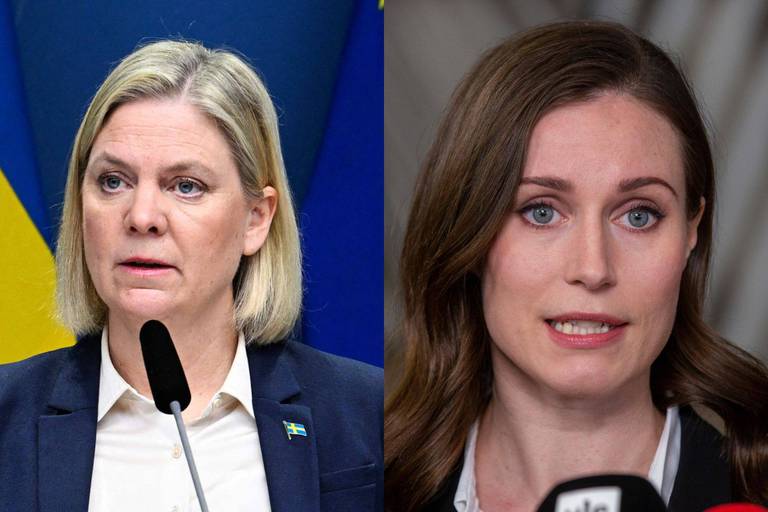Opinion polls in Sweden and Finland are showing that a majority in both countries are now in favour of joining the military alliance, and may seek to join NATO before the summer, reported The Times. Finland is expected to apply in June, and Sweden could follow soon after.
Both countries have been historically neutral or opposed to NATO membership, but after Russia's invasion of non-NATO member Ukraine, they are seeing a shift in both public opinion and among politicians.
"The two cornerstones of our security, the rule of law, the international order and a functioning relationship with Russia, were broken," said Finnish Finance Minister and Centre Party leader Annika Saarikko on Saturday, reflecting her party's stance towards NATO membership. The Finnish Centre Party is the second largest in the Finnish government, after Prime Minister Sanna Marin's Social Democrats.
The Centre Party's new outlook reflects the population, with polls showing that over 60% of Finns support NATO membership and only 20% are opposed.
Sweden
The move has put pressure on Sweden to rethink its security position. Prime Minister Magdalena Andersson from the ruling Social Democrats had spoken against membership in November, but in light of recent events has launched an internal review for party members of its international security policy, which is due to be completed by summer.
“When Russia invaded Ukraine, Sweden’s security position changed fundamentally,” the Social Democrats said in a statement on Monday.
A majority in the Swedish parliament are now reportedly in favour of NATO membership after the far-right Sweden Democrats changed their stance. Swedish Democrat leader Jimmie Åkesson said that if Finland applies, Sweden cannot be left behind as a non-NATO country.
A special relationship
It is a defining moment in the histories of both Finland and Sweden, as they potentially move away from neutrality and non-alignment. Sweden has been neutral since 1812 after the country lost a large part of its territory in the wars against Napoleon. The country maintained its neutral stance during the Second World War.
Finland on the other hand was forced towards a neutral position by the Soviet Union after its invasion during Second World War, a position which was maintained throughout the Cold War to guarantee its security and to keep Western forces at arm's length –mainly due to Finland and Russia sharing a border of 1,300 km.
When the Cold War ended, Finland eventually chose to join the EU, but Russia warned that joining NATO would signify a step too far. Recently, Russia has threatened that there would be "military and political consequences" if Finland joins the military alliance, according to the Russian news agency Interfax.
Related News
- Finland: support for NATO membership reaches historic high
- Belgian military might extend NATO mission in Estonia over Ukraine invasion
- 60% of Belgians would not take up arms to protect their country
NATO's position
The two countries have worked closely together on security issues and as close partners with NATO, but maintaining neutrality would be difficult for Sweden if Finland opts for NATO membership.
NATO appears to welcome the expansion with open arms. “If they want to, they can join with ease,” said NATO chief Jens Stoltenberg. Aspiring NATO members must demonstrate that they meet military and political criteria. But Stoltenberg has stated that as NATO's closest partners, Finland and Sweden share the same values and challenges as the military alliance.
The accession would need to be approved by the 30 other NATO members, which could leave Sweden and Finland vulnerable during the accession process. In that case, they wouldn't normally be a part of NATO yet but could have irked Russia nonetheless. However, according to De Morgen, Stoltenberg hinted that other security guarantees could be implemented during this period from other NATO members such as the US or France.
Russian expansionism
Yet, any NATO enlargement is likely to be seen as a provocation by Russia. Kremlin spokesperson, Dmitry Peskov, said on Monday that the alliance was “a tool geared towards confrontation” and that possible accession of Sweden and Finland “will not bring stability to the European continent”.
Russia wants to re-establish its spheres of interest and create another Russian empire. That's why attacking Ukraine won't be enough, warned Danish Prime Minister Mette Frederiksen in an interview with Berlingske on Sunday, underlining the urgency for Finland and Sweden.
Recently, Former Russian Prime Minister had lifted the curtain on Russia's expansionist ambitions. He described Russia's ultimate dream as creating "an open Eurasia, from Lisbon to Vladivostok" in a post on Telegram.

